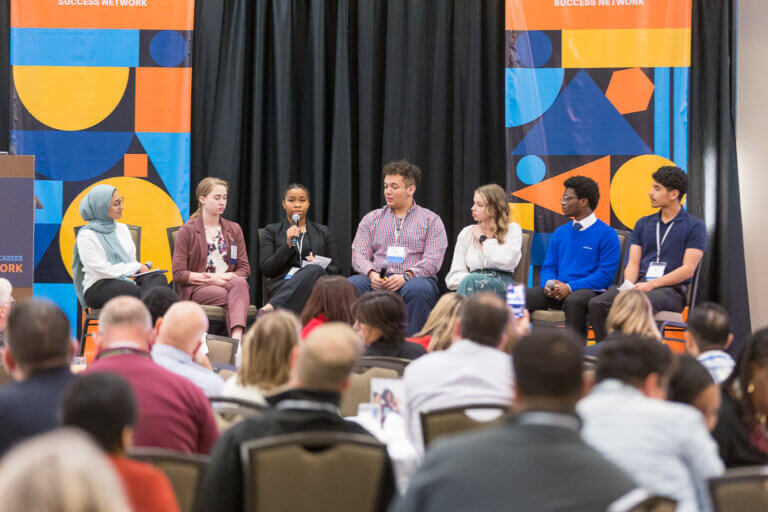While legislation often sets the course for policy, rule-making and regulatory policy profoundly shape the implementation of policy priorities. Over the past few months, two sets of rules were published for public feedback that will shape dual credit implementation in Illinois.
First, the Illinois Community College Board (ICCB) issued draft rules to address the 2022 Dual Credit Quality Act (DCQA) Amendment (Public Act 102-1077) for public comment. We submitted public comment on these proposed rules in mid-February, primarily celebrating the ICCB in implementing the Act with fidelity to the spirit of the legislation and an eye toward scaling equitable access and ensuring quality outcomes for Illinois students. We believe this act builds from the extensive work in Illinois to emphasize scaling of quality and strategic dual credit, including through the Postsecondary and Workforce Readiness (PWR) Act, Every Student Succeeds Act, Perkins V State Plan, and 2021 Education Omnibus Bill’s provisions around accelerated placement.
Further, the Higher Learning Commission (HLC) Board of Trustees is considering proposed policy changes to faculty qualifications that will shape dual credit teacher qualifications if they take effect. EdSystems is excited to see the HLC promulgate a policy recognizing the value of a broad range of experiences preparing qualified educators. The core change to faculty qualifications under this proposed policy enables postsecondary institutions to utilize not only traditional achievement of or significant progress toward academic credentials in qualification determinations but also equivalent experience. Institutions may also use some combination of all three methods, provided that they adopt a clear approach to defining and managing these processes. These proposed provisions align with the principles put forth in Illinois’ DCQA, particularly the professional development plan (PDP) provisions.
What Do These Proposed Changes Mean? Why Do They Matter?
In the case of the ICCB rules, the changes largely hew to the language in the legislation. Some of the key highlights include that teachers can still use PDPs to upskill and become qualified as dual credit instructors (including now in Career and Technical Education), which will continue alleviating the teacher pipeline challenges facing dual credit delivery. Mixed enrollment provisions in which students who do not meet the dual credit eligibility criteria may enroll in a course (with differentiated instruction as appropriate) for high school credit will help alleviate scheduling pressures and allow more students to be exposed to rigorous classroom environments. In the case of the HLC proposed policy change, individual postsecondary institutions will have the ability to take advantage of this new flexibility, but there is no requirement for them to do so.
Taken together, these policies provide opportunities for partners across the state to leverage flexibility to continue thoughtfully scaling strategic dual credit opportunities for students in alignment with our broader aims of accelerating students on their pathways to and through postsecondary.
What Should Happen Next?
While we are excited to see these proposed rules, we know that the proof will be in implementation on the ground in communities and institutions across Illinois, particularly to ensure equitable access and outcomes.
To that end, we have urged the ICCB to:
- Provide clear guidance and processes to support colleges and districts in the reporting process around PDPs.
- Engage high school teachers (both pursuing PDPs and not) to gather qualitative data around PDP utilization.
- Reconvene the institutional members of the Advisory Committee for the Model Partnership Agreement to generate a new exhibit or appendix for courses utilizing mixed enrollment that address core areas of concern.
- Document and communicate opportunities for students to earn articulated credit if they did not originally qualify for dual credit.
- Provide support to students enrolled in the high school credit section of the course to address core academic skills needs and enable them to pursue dual credit in a subsequent semester.
- Monitor disaggregated enrollment data by subject area and student demography to identify and address barriers to equitable enrollment and outcomes.
- Examine student enrollment and outcomes alongside placement policies to identify where placement policies may be posing an undue burden on student access to dual credit.
- Encourage district and college partnerships to ensure communication around mixed enrollment classrooms is proactive, clear, and reinforced through multiple channels.
While we were not providing public comment on the HLC policy change directly, we strongly encourage ICCB and IBHE to:
- Convene a working group of postsecondary institutions across Illinois that can explore the challenges and opportunities afforded by the emerging policy change and develop guidance for institutions around defining “equivalent experience,” particularly based on areas where there are significant gaps of qualified dual credit instructors.
- Develop and implement policies and guidance that will advance institutional implementation of this new flexibility in ways that address core equity gaps in the state.
Ultimately, we celebrate the new and emerging policy changes that build on many years of work to scale quality and strategic dual credit in Illinois. While there is still much work to do, we continue to be heartened by the progress made both in policy and innovative practices by our partners across the state.


